Watervale Safaris has been a proud member of the Oribi Breeding group since 2004. It is initiatives like the Oribi Custodianship that encourages individuals and private land owners to conserve specific vulnerable species.
What is Custodianship?
Custodianship is the formal recognition given to individuals of the public at large in acknowledgement of their voluntary commitment to conservation. 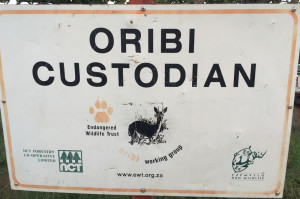 To date custodianship has been species focused with individuals being recognized for their commitment to the conservation of species on their land. Individuals are recognized through nomination by either conservation officials or fellow landowners. The nomination is then verified in terms of ensuring that those individuals do in fact contribute in the required ways to the conservation of the species in question. Currently there are two levels of acknowledgement, the first is a certificate and the second a custodian board which can optionally be mounted at the property entrance.
To date custodianship has been species focused with individuals being recognized for their commitment to the conservation of species on their land. Individuals are recognized through nomination by either conservation officials or fellow landowners. The nomination is then verified in terms of ensuring that those individuals do in fact contribute in the required ways to the conservation of the species in question. Currently there are two levels of acknowledgement, the first is a certificate and the second a custodian board which can optionally be mounted at the property entrance.
Custodianship began in South Africa in the early to mid 1990s. The existing custodianship programs are managed separately and are all species specific with the possible exception of the existing crane custodians which covers any one or all three of South Africa’s crane species. The other existing species custodian programs include the Blue Swallow ,Riverine Rabbit programs with an associated habitat recognition program for Cheetahs by the name of the Cheetah Friendly Areas program.
Oribi antelope (Ourebia ourebi)
Even though Oribi have a wide distribution on the African continent, stretching from Senegal towards Ethiopia and southwards towards South Africa, it 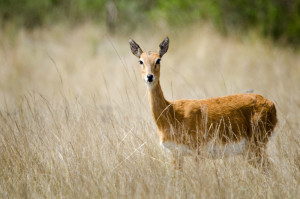 is patchily and discontinuously distributed within this area as a result of specific habitat requirements (Adamczak, 1999). In South Africa, Oribi are distributed within Mpumalanga, Gauteng, the North West, Free State, KwaZulu-Natal and the Eastern Cape (Friedmann and Daly, 2004).
is patchily and discontinuously distributed within this area as a result of specific habitat requirements (Adamczak, 1999). In South Africa, Oribi are distributed within Mpumalanga, Gauteng, the North West, Free State, KwaZulu-Natal and the Eastern Cape (Friedmann and Daly, 2004).
Recent population estimates indicate that the total population of Oribi in South Africa is likely to be between 2500 and 4500 individuals. Census data from KwaZulu-Natal indicates that the population of Oribi is declining on private land and thought to be stable in KwaZulu-Natal protected areas, although better monitoring is needed. On the basis of the small, discontinuous population size and estimated rate of decline Oribi were recently classified as Endangered (Friedmann and Daly, 2004).
The main cause of the decline is loss of grassland habitat to agricultural practices such as afforestation, cropping and pastures. In addition, many remaining grassland fragments are in poor condition as a result of poor veld management and incorrect burning regimes. In addition to these threats, hunting with dogs has caused Oribi numbers and distribution within the remaining grassland fragments to decline considerably (Viljoen, 1982; Marchant, 1991).
Oribi Conservation on Nhlamvini Game Reserve
The Oribi breeding program initiated in 2004 by owner Mo Lister, has been a great success, overcoming many hurdles along the way. This is still very much an on going project that deserves a lot of care and attention. The grassland habitat in areas of the reserve is the ideal environment for Oribi to thrive. With agricultural endeavors in the area taking the front seat for most people, it is crucial that there is an area of refuge for these endangered antelope.
2015 was a difficult year for the Oribi on the reserve. With increasing amounts of poaching pressure as well as pressure from other species for habitat, Oribi numbers hit a plateau. Poaching has a significant impact on Oribi numbers as these antelopes are prime targets in their open habitat for hunting dogs to flush and then for poachers to pursue.
In 2016 we will be reassessing Oribi numbers and strengthening security and protection measures for these special antelope. Be sure to keep an eye out for updates and more information regarding the Oribi of Nhlamvini Game Reserve.
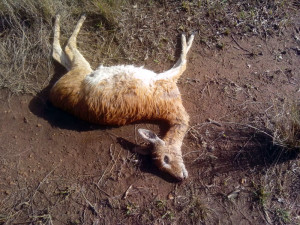
Female Oribi killed by poaching dogs
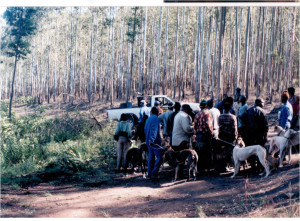
Large group of hunters and their dogs arrested for poaching on the reserve. A group of hunters of this size can have devastating results on Oribi numbers and can easily take out an entire population of Oribi.
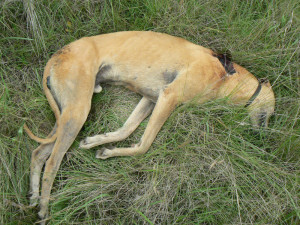
Poaching dog shot during a poaching incident
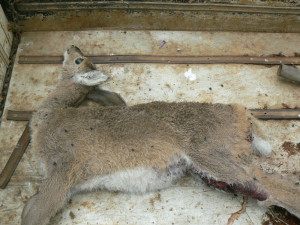
Another victim of poaching
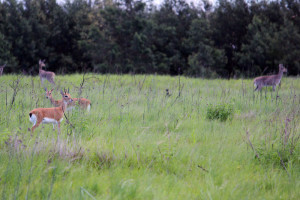
An Oribi pair in their Grassland habitat. Its breeding pairs like these that need our protection and that will usher in the next generation of Oribi on the reserve
